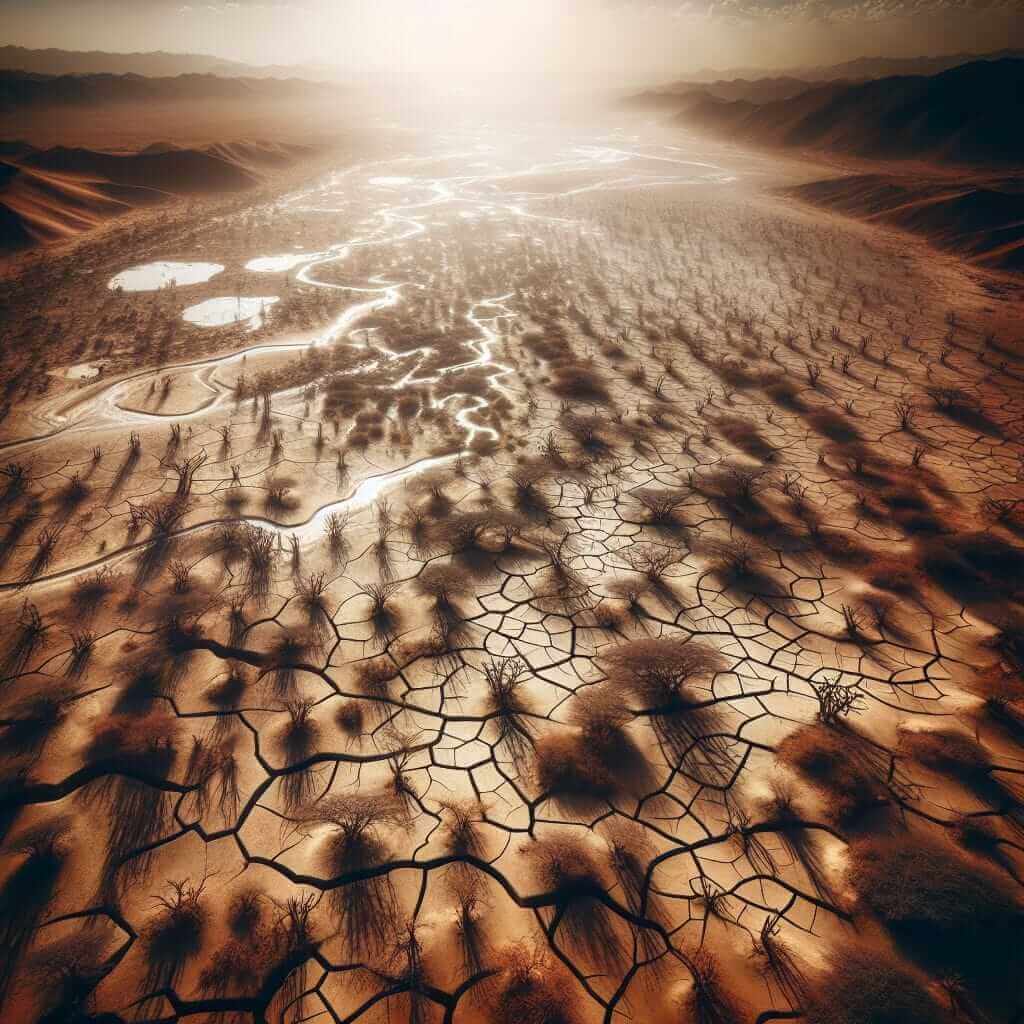The Reading section of the IELTS can be demanding, especially with topics that require both comprehension and critical thinking. One of the increasingly recurrent themes is climate change and its impact on natural resources. Considering the growing significance of this issue, it’s likely to appear in IELTS examinations.
This article aims to provide a detailed reading passage and related practice questions centered around the critical topic: “How does climate change affect the availability of freshwater resources?”. By examining this subject, you will not only expand your vocabulary and grasp complex grammar structures but also gain meaningful insights into a pressing global concern.
Reading Passage and Questions
Reading Passage
Climate Change and Freshwater Availability
Climate change, characterized by global warming and changing precipitation patterns, significantly impacts the availability of freshwater resources. Freshwater, which accounts for only about 2.5% of the Earth’s water, is crucial for drinking, agriculture, and industry. However, these resources are becoming increasingly scarce due to various climatic factors.
Firstly, the rising global temperatures lead to the melting of glaciers and ice caps, which are essential freshwater sources. For instance, the Himalayan glaciers, which supply water to rivers like the Ganges, are retreating rapidly. This reduction impacts millions of people relying on these rivers for their livelihood.
Secondly, altered precipitation patterns due to climate change result in unpredictable rainfall and extreme weather events. Some regions experience prolonged droughts, while others face severe floods. For example, the African Sahel region has seen an increase in droughts, adversely affecting both agriculture and water supply. Conversely, excessive rainfall in some areas can lead to the contamination of freshwater resources through runoff, introducing pollutants and rendering the water unsafe for consumption.

Furthermore, the rise in sea levels, driven by melting polar ice and thermal expansion of seawater, contributes to the intrusion of saltwater into freshwater aquifers and coastal areas. This salinization process depletes freshwater sources, making them unfit for drinking and irrigation purposes. Coastal cities such as Miami and Jakarta are already grappling with this issue.
Lastly, climate change exacerbates the problem of water scarcity by increasing the evaporation rates from rivers, lakes, and reservoirs. Higher temperatures accelerate the loss of freshwater, diminishing available resources. This phenomenon has been observed in regions like California, where reservoirs are at historically low levels.
In conclusion, climate change poses a substantial threat to the availability of freshwater resources worldwide. The combination of melting glaciers, altered precipitation patterns, rising sea levels, and increased evaporation rates amplifies the challenges faced by many communities. Addressing this issue requires urgent and coordinated global efforts to mitigate the impacts of climate change and ensure the sustainable management of freshwater resources.
Practice Questions
Section 1: True/False/Not Given
- Freshwater resources make up more than half of the Earth’s water.
- Himalayan glaciers are a primary source of water for the Ganges river.
- The African Sahel region has experienced increased rainfall due to climate change.
- Sea level rise has no impact on freshwater resources.
- Climate change increases evaporation rates, reducing freshwater availability.
Section 2: Matching Information
Match the following impacts of climate change (Column A) with their consequences on freshwater availability (Column B):
Column A:
- Melting glaciers
- Altered precipitation patterns
- Rising sea levels
- Increased evaporation rates
Column B:
- a) Saltwater intrusion into aquifers
- b) Reduction of water for drinking and agriculture
- c) Unpredictable rainfall and extreme weather events
- d) Accelerated loss from rivers and lakes
Section 3: Sentence Completion
- The combination of melting glaciers, __, rising sea levels, and increased evaporation rates amplifies the challenges faced by many communities.
- Freshwater, which accounts for only about ___, is crucial for drinking, agriculture, and industry.
- Climate change requires ___ to mitigate its impacts and ensure sustainable management of freshwater resources.
Answer Keys
Section 1: True/False/Not Given
- False
- True
- False
- False
- True
Section 2: Matching Information
- Melting glaciers – (b) Reduction of water for drinking and agriculture
- Altered precipitation patterns – (c) Unpredictable rainfall and extreme weather events
- Rising sea levels – (a) Saltwater intrusion into aquifers
- Increased evaporation rates – (d) Accelerated loss from rivers and lakes
Section 3: Sentence Completion
- …, altered precipitation patterns, …
- … only about 2.5%, …
- … requires urgent and coordinated global efforts …
Common Mistakes to Avoid
- Misinterpreting Information: Ensure you understand the main ideas and supporting details. Many students mistake specific points for general statements.
- Time Management: Practice pacing yourself to avoid spending too much time on difficult questions.
- Overlooking Keywords: Pay attention to keywords that signal the context or main idea of a passage.
Vocabulary
- Scarce /skɛrs/ (adj.): Limited in quantity.
- Evaporation /ɪˌvæpəˈreɪʃən/ (n.): The process of liquid turning into vapor.
- Unpredictable /ˌʌnprɪˈdɪktəbəl/ (adj.): Not able to be predicted.
- Intrusion /ɪnˈtruːʒən/ (n.): The act of entering something, particularly when unwelcome.
- Salinization /ˌsælɪnaɪˈzeɪʃən/ (n.): The process of increasing salt content.
Grammar Note
- Passive Voice: Used often in academic writing to focus on the action rather than the subject. Example: “Freshwater resources are becoming increasingly scarce.”
- Complex Sentences: Combining multiple clauses to express detailed ideas. Example: “As the temperature rises, more glaciers melt, leading to a reduction in freshwater availability.”
Advice for High Reading Scores
- Practice Regularly: Consistency is key. Include a variety of topics to build a robust vocabulary and improve comprehension skills.
- Skimming and Scanning: Develop these techniques to quickly locate information and grasp the main ideas without reading every word.
- Mock Tests: Regularly take timed practice tests to simulate exam conditions and improve time management.
By incorporating these strategies and familiarizing yourself with complex topics, you can significantly enhance your performance in the IELTS Reading section.